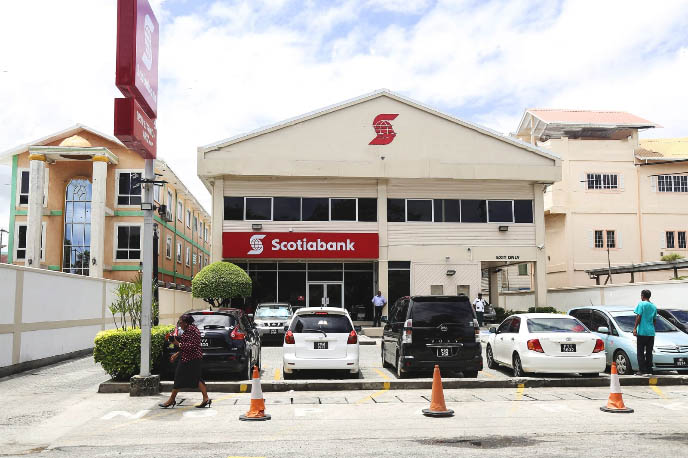Following the Full Court ruling that it “negligently misdirected” $28 million which was intended as the early extinguishing of a mortgage, Scotiabank (Guyana) has filed an appeal to the judgment which it describes as unjust.
In its motion seeking special leave to appeal before the Guyana Court of Appeal, Scotiabank—the proposed Appellant—contends that it has suffered a miscarriage of justice because the Court imposed a liability on it in excess of $30 million, including costs.
In their ruling handed down on December 1st last, Justices Navindra Singh and Priya Sewnarine-Beharry ordered the bank to apply the $28m paid by Core Investments Inc as originally intended and in addition directed it to pay the company $1m in damages and $1m in costs.
In its notice of motion filed on December 15th last, the bank argues that the Full Court disposed of the appeal on a cause of action which was raised by Core Investments in neither the High Court nor the Full Court; and for which no evidence was led by either party.
This, the bank advances, has caused it to suffer injustice by the court’s finding of it being liable to Core Investments—the proposed Respondent—without giving the parties any notice that such a cause of action or the imposition thereof was under contemplation by the court.
The bank said, too, that no submissions were heard from either side, on the cause of action.
Scotiabank argues that with the imposition of liability on it in excess of $30,000,000 including costs, the Full Court made findings of fact on issues for which there was no cross-examination for which Core Investments would have had the burden of proving.
The bank contends through its attorney Kamal Ramkarran, that it also suffered a miscarriage of justice “because the Full Court made findings of fact and drew conclusions on issues which could only be resolved to contradict the narrative provided by it “after the leading of expert evidence” on the practice of bankers by Core Investments.
The bank complains, too, that the Court unjustly found it negligent “without there being a trial on the issue of negligence,” more so since that issue was never raised by Core Investments before either the High or Full Courts.
According to Scotiabank the Full Court sought to set aside the High Court ruling without reference to any error on the part of the trial judge in respect to privity of contract between the parties.
The bank says its appeal raises important questions of the law of evidence in respect of the practice of bankers and appellate practice and procedure, especially on the limits on appellate courts in “unilaterally” making findings on issues not raised or argued by the parties.
The bank is of the view that its appeal has merit and therefore has good prospects of succeeding.
Background
In setting aside the earlier judgment of February 15th, 2023 made by Justice Damone Younge, the Full Court was scathing in its criticism of the bank.
The property at the centre of the litigation was owned by Justin Teixeira, who was reported to have died by suicide back in April of 2022—close to a month after striking the business deal with Core Investments Inc.
Core Investments Inc., located at Lot 241 Bara-mita Street, South Ruim-veldt Gardens, had entered into an agreement of sale on March 28th, 2022 to make the purchase from Teixeira.
The property situated on parcel 293: block II: Zone East Bank Demerara; carried a price tag of $58,000,000 of which the sum of $47,000,000 was paid when the agreement was signed on the said date.
The property was encumbered by a mortgage in favour of the Bank of Nova Scotia at the time of the signing of the agreement and as a result, the agreement provided for the sum of $47,000,000 to be paid in the following manner: $28,000,000 to be paid to Scotiabank, by way of a Republic Bank (Guyana) Limited manager’s cheque for the purpose of liquidating the mortgage—and the sum of $19,000,000 to be paid to the vendor, Teixeira.
According to the case file, Core Investments duly purchased the manager’s cheque in the sum of $28,000,000 from Republic Bank, payable to “Bank of Nova Scotia,” and gave it to Teixeira on the signing of the agreement.
Teixeira, the file stated, then placed that cheque into Scotiabank’s “Express Deposit Box” the very next day after the agreement had been signed but the bank subsequently deposited the cheque into his (Teixeira’s) account.
Evidence presented before the court, revealed that on April 8th, 2022 Teixeira purchased a manager’s cheque for the sum of $50,000,000 payable to a relative and also made other withdrawals from his account, leaving a balance of $169,133 in his account.
The court in its written judgment noted Teixeira’s death by suicide on April 23rd, at the time of which his account had the balance of $169,133; while underscoring that the $28,000,000 contained in the manager’s cheque had never been applied to the mortgage on the property and as a result, the property remained encumbered to Scotia Bank.
It was on November 28th, 2022 that Core Investments applied to the High Court for, among other things, an order that Scotiabank return the $28,000,000 to it in restitution; arguing that since the cheque was not payable to Teixeira, the bank could not have lawfully deposited it into his account.
Scotiabank’s contention had been, however, that since it was not a party to the agreement, it was not privy to the contract and therefore was not bound by the terms of the agreement; arguing further that its duty was to its customer—Teixeira—who it said had instructed it to deposit the cheque into his account.
Core Investments is being represented by Senior Counsel Roysdale Forde.










